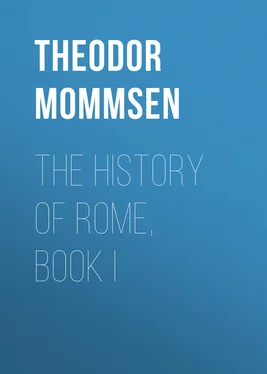Theodor Mommsen - The History of Rome, Book I
Здесь есть возможность читать онлайн «Theodor Mommsen - The History of Rome, Book I» — ознакомительный отрывок электронной книги совершенно бесплатно, а после прочтения отрывка купить полную версию. В некоторых случаях можно слушать аудио, скачать через торрент в формате fb2 и присутствует краткое содержание. Жанр: foreign_prose, История, foreign_edu, foreign_antique, на английском языке. Описание произведения, (предисловие) а так же отзывы посетителей доступны на портале библиотеки ЛибКат.
- Название:The History of Rome, Book I
- Автор:
- Жанр:
- Год:неизвестен
- ISBN:нет данных
- Рейтинг книги:5 / 5. Голосов: 1
-
Избранное:Добавить в избранное
- Отзывы:
-
Ваша оценка:
- 100
- 1
- 2
- 3
- 4
- 5
The History of Rome, Book I: краткое содержание, описание и аннотация
Предлагаем к чтению аннотацию, описание, краткое содержание или предисловие (зависит от того, что написал сам автор книги «The History of Rome, Book I»). Если вы не нашли необходимую информацию о книге — напишите в комментариях, мы постараемся отыскать её.
The History of Rome, Book I — читать онлайн ознакомительный отрывок
Ниже представлен текст книги, разбитый по страницам. Система сохранения места последней прочитанной страницы, позволяет с удобством читать онлайн бесплатно книгу «The History of Rome, Book I», без необходимости каждый раз заново искать на чём Вы остановились. Поставьте закладку, и сможете в любой момент перейти на страницу, на которой закончили чтение.
Интервал:
Закладка:
9
Thus -aro-, -aratrum- reappear in the old German -aran- (to plough, dialectically -eren-), -erida-, in Slavonian -orati-, -oradlo-, in Lithuanian -arti-, -arimnas-, in Celtic -ar-, -aradar-. Thus alongside of -ligo- stands our rake (German -rechen-), of -hortus- our garden (German -garten-), of -mola- our mill (German -muhle-, Slavonic -mlyn-, Lithuanian -malunas-, Celtic -malin-).
With all these facts before us, we cannot allow that there ever was a time when the Greeks in all Hellenic cantons subsisted by purely pastoral husbandry. If it was the possession of cattle, and not of land, which in Greece as in Italy formed the basis and the standard of all private property, the reason of this was not that agriculture was of later introduction, but that it was at first conducted on the system of joint possession. Of course a purely agricultural economy cannot have existed anywhere before the separation of the stocks; on the contrary, pastoral husbandry was (more or less according to locality) combined with it to an extent relatively greater than was the case in later times.
10
Nothing is more significant in this respect than the close connection of agriculture with marriage and the foundation of cities during the earliest epoch of culture. Thus the gods in Italy immediately concerned with marriage are Ceres and (or?) Tellus (Plutarch, Romul. 22; Servius on Aen. iv. 166; Rossbach, Rom. Ehe, 257, 301), in Greece Demeter (Plutarch, Conjug. Praec. init.); in old Greek formulas the procreation of children is called —arotos—(ii. The Family and the State, note); indeed the oldest Roman formof marriage, -confarreatio-, derives its name and its ceremony from the cultivation of corn. The use of the plough in the founding of cities is well known.
11
Among the oldest names of weapons on both sides scarcely any can be shown to be certainly related; -lancea-, although doubtless connected with -logchei-, is, as a Roman word, recent, and perhaps borrowed from the Germans or Spaniards.
12
Even in details this agreement appears; e.g., in the designation of lawful wedlock as "marriage concluded for the obtaining of lawful children" (—gauos epi paidon gneision aroto—, -matrimonium liberorum quaerendorum causa-).
13
Only we must, of course, not forget that like pre-existing conditions lead everywhere to like institutions. For instance, nothing is more certain than that the Roman plebeians were a growth originating within the Roman commonwealth, and yet they everywhere find their counterpart where a body of -metoeci- has arisen alongside of a body of burgesses. As a matter of course, chance also plays in such cases its provoking game.
14
I. II. Italians
15
Like -latus- (side) and —platus— (flat); it denotes therefore the flat country in contrast to the Sabine mountain-land, just as Campania, the "plain," forms the contrast to Samnium. Latus, formerly -stlatus-, has no connection with Latium.
16
A French statist, Dureau de la Malle (-Econ. Pol. des Romains-, ii. 226), compares with the Roman Campagna the district of Limagne in Auvergne, which is likewise a wide, much intersected, and uneven plain, with a superficial soil of decomposed lava and ashes—the remains of extinct volcanoes. The population, at least 2500 to the square league, is one of the densest to be found in purely agricultural districts: property is subdivided to an extraordinary extent. Tillage is carried on almost entirely by manual labour, with spade, hoe, or mattock; only in exceptional cases a light plough is substituted drawn by two cows, the wife of the peasant not unfrequently taking the place of one of them in the yoke. The team serves at once to furnish milk and to till the land. They have two harvests in the year, corn and vegetables; there is no fallow. The average yearly rent for an arpent of arable land is 100 francs. If instead Of such an arrangement this same land were to be divided among six or seven large landholders, and a system of management by stewards and day labourers were to supersede the husbandry of the small proprietors, in a hundred years the Limagne would doubtless be as waste, forsaken, and miserable as the Campagna di Roma is at the present day.
17
In Slavonia, where the patriarchal economy is retained up to the present day, the whole family, often to the number of fifty or even a hundred persons, remains together in the same house under the orders of the house-father (Goszpodar) chosen by the whole family for life. The property of the household, which consists chiefly in cattle, is administered by the house-father; the surplus is distributed according to the family-branches. Private acquisitions by industry and trade remain separate property. Instances of quitting the household occur, in the case even of men, e. g. by marrying into a stranger household (Csaplovies, -Slavonien-, i. 106, 179). —Under such circumstances, which are probably not very widely different from the earliest Roman conditions, the household approximates in character to the community.
18
The Latin festival is expressly called "armistice" (-indutiae-, Macrob. Sat. i. 16; —ekecheipiai—, Dionys. iv. 49); and a war was not allowed to be begun during its continuance (Macrob. l. c.)
19
The assertion often made in ancient and modern times, that Alba once ruled over Latium under the forms of a symmachy, nowhere finds on closer investigation sufficient support. All history begins not with the union, but with the disunion of a nation; and it is very improbable that the problem of the union of Latium, which Rome finally solved after some centuries of conflict, should have been already solved at an earlier period by Alba. It deserves to be remarked too that Rome never asserted in the capacity of heiress of Alba any claims of sovereignty proper over the Latin communities, but contented herself with an honorary presidency; which no doubt, when it became combined with material power, afforded a handle for her pretensions of hegemony. Testimonies, strictly so called, can scarcely be adduced on such a question; and least of all do such passages as Festus -v. praetor-, p. 241, and Dionys. iii. 10, suffice to stamp Alba as a Latin Athens.
20
A similar change of sound is exhibited in the case of the following formations, all of them of a very ancient kind: -pars—portio-, -Mars- -Mors-, -farreum- ancient form for -horreum-, -Fabii- -Fovii-, -Valerius- -Volesus-, -vacuus- -vacivus-.
21
The —synoikismos— did not necessarily involve an actual settlement together at one spot; but while each resided as formerly on his own land, there was thenceforth only one council-hall and court-house for the whole (Thucyd. ii. 15; Herodot. i. 170).
22
We might even, looking to the Attic —trittus— and the Umbrian -trifo-, raise the question whether a triple division of the community was not a fundamental principle of the Graeco-ltalians: in that case the triple division of the Roman community would not be referable to the amalgamation of several once independent tribes. But, in order to the establishment of a hypothesis so much at variance with tradition, such a threefold division would require to present itself more generally throughout the Graeco-Italian field than seems to be the case, and to appear uniformly everywhere as the ground-scheme. The Umbrians may possibly have adopted the word -tribus- only when they came under the influence of Roman rule; it cannot with certainty be traced in Oscan.
23
Интервал:
Закладка:
Похожие книги на «The History of Rome, Book I»
Представляем Вашему вниманию похожие книги на «The History of Rome, Book I» списком для выбора. Мы отобрали схожую по названию и смыслу литературу в надежде предоставить читателям больше вариантов отыскать новые, интересные, ещё непрочитанные произведения.
Обсуждение, отзывы о книге «The History of Rome, Book I» и просто собственные мнения читателей. Оставьте ваши комментарии, напишите, что Вы думаете о произведении, его смысле или главных героях. Укажите что конкретно понравилось, а что нет, и почему Вы так считаете.











